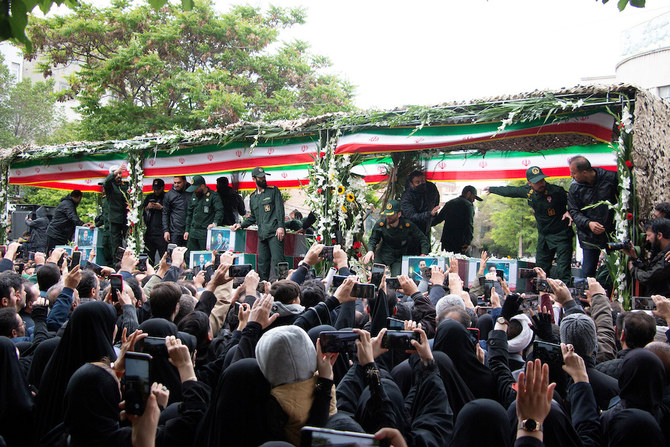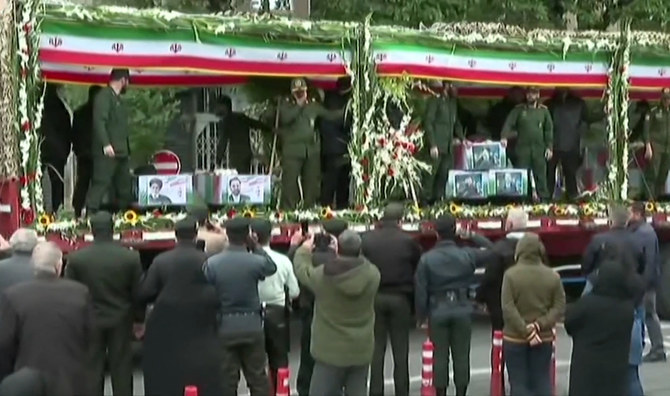TEHRAN: Tens of thousands of Iranians gathered Tuesday to mourn president Ebrahim Raisi and seven members of his entourage who were killed in a helicopter crash on a fog-shrouded mountainside in the northwest.
Waving Iranian flags and portraits of the late president, mourners set off from a central square in the northwestern city of Tabriz, where Raisi was headed when his helicopter crashed on Sunday.
They walked behind a lorry carrying the coffins of Raisi and his seven aides.
Their helicopter lost communications while it was on its way back to Tabriz after Raisi attended the inauguration of a joint dam project on the Aras river, which forms part of the border with Azerbaijan, in a ceremony with his counterpart Ilham Aliyev.
A massive search and rescue operation was launched on Sunday when two other helicopters flying alongside Raisi’s lost contact with his aircraft in bad weather.
State television announced his death in a report early on Monday, saying “the servant of the Iranian nation, Ayatollah Ebrahim Raisi, has achieved the highest level of martyrdom,” showing pictures of him as a voice recited the Qur’an.
Killed alongside the Iranian president were Foreign Minister Hossein Amir-Abdollahian, provincial officials and members of his security team.
Iran’s armed forces chief of staff Mohammad Bagheri ordered an investigation into the cause of the crash as Iranians in cities nationwide gathered to mourn Raisi and his entourage.
Tens of thousands gathered in the capital’s Valiasr Square on Monday.
Supreme leader Ayatollah Ali Khamenei, who has ultimate authority in Iran, declared five days of national mourning and assigned vice president Mohammad Mokhber, 68, as caretaker president until a presidential election can be held.
State media later announced that the election would will be held on June 28.
Iran’s top nuclear negotiator Ali Bagheri, who served as deputy to Amir-Abdollahian, was named acting foreign minister.
From Tabriz, Raisi’s body will be flown to the Shiite clerical center of Qom on Tuesday before being moved to Tehran that evening.
Processions will be held in in the capital on Wednesday morning before Khamenei leads prayers at a farewell ceremony.
Raisi’s body will then be flown to his home city of Mashhad, in the northeast, where he will be buried on Thursday evening after funeral rites.
Raisi, 63, had been in office since 2021. The ultra-conservative’s time in office saw mass protests, a deepening economic crisis and unprecedented armed exchanges with arch-enemy Israel.
Raisi succeeded the moderate Hassan Rouhani, at a time when the economy was battered by US sanctions imposed over Iran’s nuclear activities.
Condolence messages flooded in from Iran’s allies around the region, including the Syrian government, Palestinian militant group Hamas and Lebanese militant group Hezbollah.
It was an unprecedented Hamas attack on Israel that sparked the devastating war in Gaza, now in its eighth month, and soaring tensions between Israel and the “resistance axis” led by Iran.
Israel’s killing of seven Revolutionary Guards in a drone strike on the Iranian consulate in Damascus on April 1 triggered Iran’s first ever direct attack on Israel, involving hundreds of missiles and drones.
In a speech hours before his death, Raisi underlined Iran’s support for the Palestinians, a centerpiece of its foreign policy since the 1979 Islamic revolution.
Palestinian flags were raised alongside Iranian flags at ceremonies held for the late president.






























